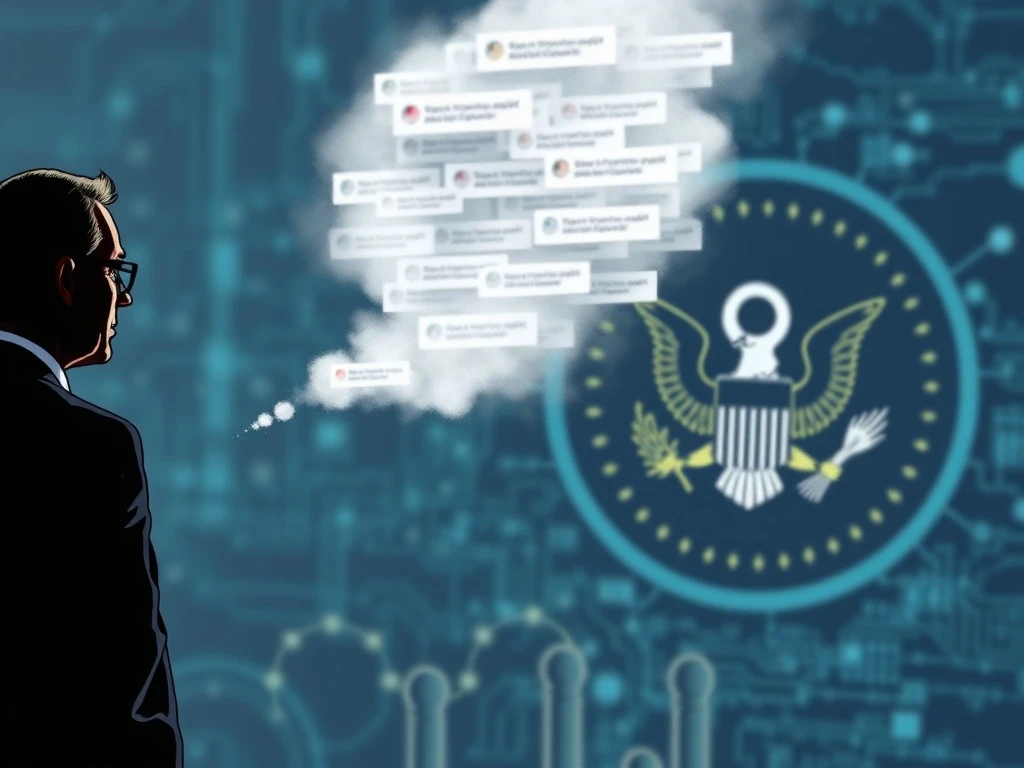Unsettling Disappearance: Gary Gensler’s Texts Vanish, Raising SEC Crypto Enforcement Questions

The disappearance of a year’s worth of Gary Gensler’s texts has sent ripples through the cryptocurrency community. These missing communications, crucial to understanding the SEC’s aggressive stance on digital assets, raise significant questions. Many observers now wonder about the true extent of the SEC’s regulatory transparency and its impact on the broader crypto ecosystem.
Gary Gensler Texts: A Critical Year Wiped Away
A recent Securities and Exchange Commission (SEC) investigation revealed a troubling incident. Specifically, nearly a year of former SEC Chair Gary Gensler’s text messages vanished. This period, from October 2022 to September 2023, was particularly active for the agency. It marked the height of the SEC’s intensified SEC crypto enforcement campaign. Consequently, the loss of these records has ignited considerable debate and concern among industry stakeholders.
The SEC Office of Inspector General (OIG) concluded its inquiry into this significant data loss. Their report, released on Wednesday, highlighted “avoidable errors.” The OIG found that the SEC’s IT department was responsible. They “implemented a poorly understood and automated policy,” leading to an enterprise wipe of Gensler’s government-issued mobile device. This action deleted all stored text messages and operating system logs. Therefore, critical information from a pivotal time in crypto regulation is now permanently gone.
The Fallout of Mobile Device Data Loss
The OIG report detailed several contributing factors to this extensive mobile device data loss. These include:
- Poor change management practices.
- A significant lack of proper data backups.
- Ignored system alerts that could have prevented the issue.
- Unaddressed vendor software flaws within the system.
Moreover, the IT department failed to collect or maintain necessary log data. This failure means the commission cannot definitively determine why Gensler’s smartphone stopped communicating with the SEC’s mobile device management system. This lack of clear answers only deepens the mystery surrounding the incident.
The timeline of events leading to the loss of Gensler’s text messages is critical. This period coincided with major developments in the crypto space, including the FTX collapse and significant legal battles involving the SEC. Consequently, the absence of these records leaves a substantial void in the historical context of these events. Investigators did manage to recover approximately 1,500 messages from colleagues and other records. However, these represent only a fraction of the total communications from that period.
Impact on SEC Crypto Enforcement Actions
The OIG explicitly stated that some of Gensler’s deleted texts involved SEC enforcement actions against crypto companies and their founders. This revelation is particularly alarming for those seeking greater regulatory transparency. Key communications about the agency’s strategies, timing, and rationale for pursuing cases may now be lost forever. This information is vital not only for the public but also for courts and Congress.
One notable example cited in the report involved a May 2023 conversation. This discussion included Gensler, his staff, and the Director of the Division of Enforcement. It concerned the timing of an action against “certain crypto asset trading platforms and their founder.” The inability to access such discussions undermines the accountability of regulatory bodies. It further complicates efforts to understand the motivations behind significant enforcement decisions. This situation has fueled skepticism within the crypto community.
The SEC’s Inspector General released a report on the loss of text messages from former Chair Gary Gensler due to avoidable errors by the agency’s IT office between October 2022 and September 2023. This news highlights ongoing concerns about the integrity of regulatory processes.
The Irony: SEC’s Own Record-Keeping Scrutiny
Adding a layer of irony to this situation, the SEC itself was actively cracking down on record-keeping practices during the same period. Around the time Gensler’s messages vanished, the agency charged several global investment banking and financial institutions. These charges stemmed from violations of record-keeping and books-and-records laws under the 1934 Securities and Exchange Act. Gensler himself commented on these actions, stating, “Finance, ultimately, depends on trust. By failing to honor their recordkeeping and books-and-records obligations, the market participants we have charged today have failed to maintain that trust.” This statement now resonates differently given the SEC’s own internal failures regarding data retention.
This stark contrast between the SEC’s external enforcement and internal lapses raises serious questions. It challenges the agency’s credibility in promoting transparency and accountability across financial markets. Many believe that if the SEC expects high standards from regulated entities, it must first uphold those standards within its own operations. This incident, therefore, serves as a critical test of the agency’s commitment to its stated principles.
Addressing Regulatory Transparency and Future Crypto Regulation News
In response to the incident, the SEC has taken several corrective measures. They have since disabled text messaging on most devices. Furthermore, they notified the National Archives and Records Administration about the lost records. The agency also introduced Capstone-specific records training for senior officials. Finally, they started improving backup practices for senior officials’ devices. These steps aim to prevent similar incidents in the future and enhance regulatory transparency.
However, the impact of this mobile device data loss remains significant. The loss of Gensler’s text messages may affect the SEC’s ability to respond fully to certain Freedom of Information Act (FOIA) requests. This could further obscure public understanding of past decisions. Gensler, who stepped down in January, was known in the crypto community for his controversial “come in and get registered” offer. This offer often preceded numerous SEC actions against companies that claimed they had attempted to comply. Enforcement actions against crypto companies reached a 10-year high in 2023, making the lost records even more pertinent.
The implications for future crypto regulation news are profound. Experts like Nate Geraci, President of NovaDius Wealth Management, observed, “Think about everything that happened in crypto during this time. Basically, FTX collapse through the Grayscale spot BTC ETF lawsuit… makes you think.” Custodia Bank founder Caitlin Long quipped, “So Gary Gensler’s text messages from his tenure as SEC chairman are forever lost in a mysterious ‘boating accident’ ???.” These reactions highlight the deep-seated skepticism and the demand for greater accountability from regulatory bodies in the digital asset space.









